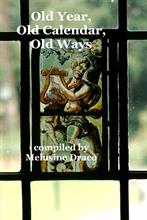
Willow Magic: There are several different species of willow but they all have similar medicinal properties and can be used interchangeably in magic. Willows are one of the earliest colonisers of these Islands and it should come as no surprise that it can be found in the Celtic tree alphabet; it is classed as one of the Peasant Trees and bears the name saill. In Celtic times, those wishing to learn eloquence, to be granted visions, prophetic dreams or inspiration, frequented groves of willow. Artists and artisans who learned their craft in willow groves were reputed to be especially skilled.
1st Veneralis, the Feast of Venus and All Fool’s Day for the Romans when everyone participated in ludicrous celebrations; a custom that has persisted down through the ages to the present day as have many of the other important old Roman festivals that were assimilated into the later Church calendar and the deities given saints’ names. Today: The tricks we play on our friends and neighbours should be rooted in good fun not malice.
Weather-lore: If it thunders on All Fools’ Day, it brings good crops of corn and hay.
Eastertide: St Ives’ Great Easter Fair [Hunts] was huge and eventually drew merchants from Flanders, Brabant, Norway, Germany and France for a four-week event each year, turning the normally small town into ‘a major commercial emporium’. Dozens of stalls would be established and hundreds of pounds of goods bought and sold; the fair being one of Ramsey Abbey’s biggest local sources of income. A Royal charter for the fair was first granted in 1110 by Henry I and allowed the Abbot to hold a fair at Slepe (as St Ives was still called then) for eight days each Easter. During the 12th and 13th centuries St Ives was one of the most important fairs in the whole country. It was an important market for cloth and it is no coincidence that the fair declined at the same time as a sudden collapse in the English weaving industry in the years around 1300. Later royal charters changed the dates of the fair and there was also a short-lived August fair, and other charters to set up weekly markets but the 1110 charter was the first. Today: Treat this as a family day out just as our forebears would have done.
At Hungerford, Berkshire, the Hocktide Festival commemorates the patronage of John of Gaunt who granted the town special fishing and grazing rights in 1364. He also gave the town his hunting horn which is preserved in the vaults of the local bank; a replica of this horn in blown annually in the Corn Market to summon the local people to the Festival. ‘Hoke Monday was for the men and Hoke Tuesday for the women. On both days the men and women alternately, with great merriment obstructed the public road with ropes and pulled passengers to them, from whom they extracted money to be laid out in pious uses.’ [Brand’s Antiquities] Today: Treat this as a family day out just as our forebears would have done.
Hocktide: A very old medieval festival used to denote the Monday and Tuesday in the week following the second Tuesday after Easter to commemorate the day when the English surprised and slew the Danes, who had annoyed them for 255 years. This Tuesday was long held as a festival in England and landlords received an annual tribute called hock-money, for allowing their tenants and serfs to celebrate Hock-Day. Together with Whitsuntide, the twelve days of Yuletide and the week following Easter marked the only vacations of the husbandman’s year during slack times in the cycle of the seasons.
4th Megalesia: Another ancient seasonal festival of Cybele, the Great Mother Goddess, who may have originated in Neolithic times. She was worshipped in Phrygia, Ancient Greece and throughout the Roman Empire. See 22nd March Attis Arbour Intrat and 25th the Hilaria. The Megalesia celebrated the anniversary of Cybele’s arrival in Rome. The festival structure is unclear, but it included ludi scaenici (plays and other entertainments based on religious themes), probably performed on the deeply stepped approach to her temple; some of the plays were commissioned from well-known playwrights. Today: Observe this as a traditional day to welcome the Great Mother into your home with lots of flowers.
6th Old Lady Day. This would be the traditional day for rents to be collected as per the old Julian calendar.
14th The cuckoo sings from St Tiburtius’s Day (14th April) to St John’s Day (24th June) and is the sign that Spring has arrived. The bird’s arrival is usually mid-April but in Worcestershire there is the saying that the cuckoo is never heard before the Tenbury Fair (21st April) or after the Pershore Fair (26th June). The discrepancy in dates is because traditionally the bird arrives in different parts of the country on different days during April. Various April dates were called ‘Cuckoo Days’ and some places still hold ‘Cuckoo Fairs’ – such as Marsden Cuckoo Day in West Yorkshire, a traditional annual festival that celebrates the arrival of Spring; Heathfield Cuckoo Fair in East Sussex marked the traditional myth of releasing of the cuckoo from a basket when it flies north carrying the warm weather with it; or Downton Cuckoo Fair in Wiltshire held on the village green to mark the ‘opening of the gate’ to let the cuckoo through. Today: Make a wish when you hear the first cuckoo.
15th Fordicidia, a Roman festival to promote the fertility of cattle and fields, usually held on the Ides of April. Today: Observe one of the pastoral festivals with a simple lunch in the open air.
21st Parilia, a festival to honour the old Roman pastoral goddess Pales and observed by driving livestock through burning straw to cleanse both sheep and shepherd. Today: Observe one of the pastoral festivals with a simple lunch in the open air.
23rd Shakespeare Day. Marks the date of the Bard’s birth (1584) and also the anniversary of his death (1613). The memorial to him is located inside Holy Trinity Church at Stratford-upon-Avon, the church in which Shakespeare was baptised and where he was buried in the chancel two days after his death. It carries the inscription: ‘Good friend for Jesus sake forbeare, To dig the dust enclosed here. Blessed be the man that spares these stones, And cursed be he that moves my bones.’ Which is a full-blown curse if ever I heard one! Today: Watch your favourite Shakespeare play.
23rd Feast of Saint George who, according to legend, was a Roman - soldier of Greek origin and an officer in the Praetorian Guard of Roman emperor Diocletian, who was sentenced to death for failing to recant his Christian faith. As a Christian martyr, he later became one of the most venerated saints in Christianity and in particular during the Crusades. Edward III of England put his Order of the Garter under the banner of St. George around c1348. The chronicler Jean Froissart observed the English invoking Saint George as a battle cry on several occasions during the Hundred Years’ Wars, which explains the rallying cry in Shakespeare’s Henry V: ‘Cry God for Harry, England, and Saint George’. In his rise as a national saint, George did not become the patron saint of England until the 14th century because he remained obscured by Edmund the Martyr, the traditional patron saint of England, until in 1552 during the reign of Edward VI, all saints’ banners other than George’s were abolished because the king wanted to identify with a more befitting hero. Today: Celebrate this national day of England.
24th St Mark’s Eve. The night on which all persons fated to be married or to die during the coming year, were supposed to pass in procession through the church porch. From a very early period there has existed a belief in the existence of a power of prophecy at that period which precedes death [Folk-Lore in Shakespeare].
.25th Robigalia was a Roman festival where sacrifices were made to protect grain fields from disease. The celebration included chariot races, games and a blood sacrifice. A prayer for the occasion is quoted in Ovid’s Fasti, Book IV. It begins: ‘Scaly Mildew, spare the blades of corn, and let their tender tips quiver above the soil. Let the crops grow, nurtured by favourable stars, until they’re ready for the sickle’. Today: Here we might offer up the prayer with a libation poured in the vegetable plot to encourage a healthy crop.
27th Floralia is the beginning of a Roman spring festival that honoured Flora the goddess of flowers. According to Willian Warde Fowler’s The Roman Festivals of the Period of the Republic the festival had a licentious, pleasure-seeking atmosphere. “In contrast to festivals based on Rome’s archaic patrician religion, the games of Flora had a plebian character.” Today: The elements of the Parilia and the Floralia may have contributed to the later Beltaine celebrations as the Roman Empire spread into Britain.
Weather-lore: ‘April wet, good wheat’.
30th Walpurgis Night is the English translation of Walpurgisnacht one of the Dutch and German names for the eve of the feast day of 8th century St Walpurga. In Germanic folklore is also called Hexennacht, literally ‘Witches’ Night’, and believed to be the night of a witches’ meeting on the Brocken, the highest peak in the Harz Mountains, a range of wooded hills in central Germany between the rivers Weser and Elbe. The first known written occurrence of the English translation ‘Walpurgis Night’ is from the 19th century. Today: Modern Beltaine Eve.


 RSS Feed
RSS Feed